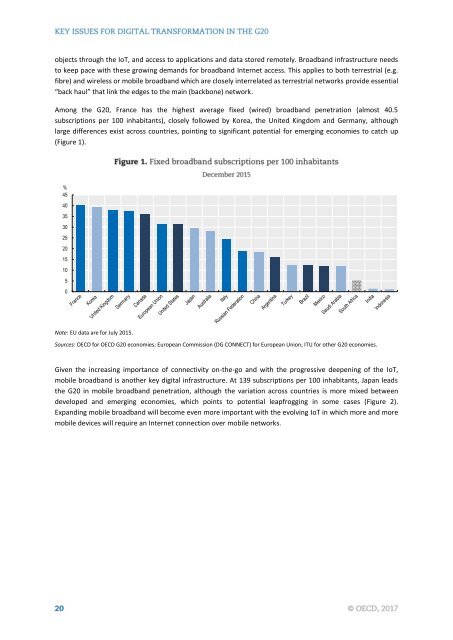KEY ISSUES FOR DIGITAL TRANSFORMATION IN THE G20
2jz0oUm
2jz0oUm
Create successful ePaper yourself
Turn your PDF publications into a flip-book with our unique Google optimized e-Paper software.
objects through the IoT, and access to applications and data stored remotely. Broadband infrastructure needs<br />
to keep pace with these growing demands for broadband Internet access. This applies to both terrestrial (e.g.<br />
fibre) and wireless or mobile broadband which are closely interrelated as terrestrial networks provide essential<br />
“back haul” that link the edges to the main (backbone) network.<br />
Among the <strong>G20</strong>, France has the highest average fixed (wired) broadband penetration (almost 40.5<br />
subscriptions per 100 inhabitants), closely followed by Korea, the United Kingdom and Germany, although<br />
large differences exist across countries, pointing to significant potential for emerging economies to catch up<br />
(Figure 1).<br />
%<br />
45<br />
40<br />
35<br />
30<br />
25<br />
20<br />
15<br />
10<br />
5<br />
0<br />
Note: EU data are for July 2015.<br />
Sources: OECD for OECD <strong>G20</strong> economies; European Commission (DG CONNECT) for European Union; ITU for other <strong>G20</strong> economies.<br />
Given the increasing importance of connectivity on-the-go and with the progressive deepening of the IoT,<br />
mobile broadband is another key digital infrastructure. At 139 subscriptions per 100 inhabitants, Japan leads<br />
the <strong>G20</strong> in mobile broadband penetration, although the variation across countries is more mixed between<br />
developed and emerging economies, which points to potential leapfrogging in some cases (Figure 2).<br />
Expanding mobile broadband will become even more important with the evolving IoT in which more and more<br />
mobile devices will require an Internet connection over mobile networks.


